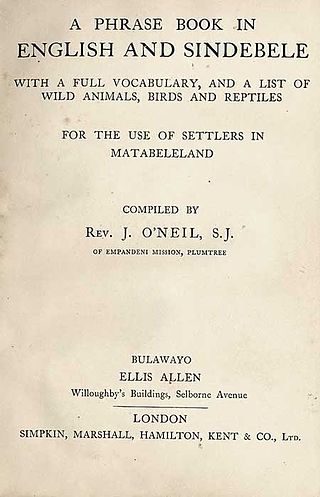Ethnologue: Languages of the World is an annual reference publication in print and online that provides statistics and other information on the living languages of the world. It is the world's most comprehensive catalogue of languages. It was first issued in 1951, and is now published by SIL International, an American evangelical Christian non-profit organization.

SIL International is an evangelical Christian nonprofit organization whose main purpose is to study, develop and document languages, especially those that are lesser-known, in order to expand linguistic knowledge, promote literacy, translate the Christian Bible into local languages, and aid minority language development.
ISO 639-3:2007, Codes for the representation of names of languages – Part 3: Alpha-3 code for comprehensive coverage of languages, is an international standard for language codes in the ISO 639 series. It defines three-letter codes for identifying languages. The standard was published by International Organization for Standardization (ISO) on 1 February 2007.

Northern Ndebele, also called Ndebele, isiNdebele saseNyakatho, Zimbabwean Ndebele or North Ndebele, associated with the term Matabele, is a Bantu language spoken by the Northern Ndebele people which belongs to the Nguni group of languages.
ISO 639-5:2008 "Codes for the representation of names of languages—Part 5: Alpha-3 code for language families and groups" is a highly incomplete international standard published by the International Organization for Standardization (ISO). It was developed by ISO Technical Committee 37, Subcommittee 2, and first published on May 15, 2008. It is part of the ISO 639 series of standards.
Language documentation is a subfield of linguistics which aims to describe the grammar and use of human languages. It aims to provide a comprehensive record of the linguistic practices characteristic of a given speech community. Language documentation seeks to create as thorough a record as possible of the speech community for both posterity and language revitalization. This record can be public or private depending on the needs of the community and the purpose of the documentation. In practice, language documentation can range from solo linguistic anthropological fieldwork to the creation of vast online archives that contain dozens of different languages, such as FirstVoices or OLAC.
The Pangloss Collection is a digital library whose objective is to store and facilitate access to audio recordings in endangered languages of the world. Developed by the LACITO centre of CNRS in Paris, the collection provides free online access to documents of connected, spontaneous speech, in otherwise little-documented languages of all continents.
Geospatial metadata is a type of metadata applicable to geographic data and information. Such objects may be stored in a geographic information system (GIS) or may simply be documents, data-sets, images or other objects, services, or related items that exist in some other native environment but whose features may be appropriate to describe in a (geographic) metadata catalog.
This page is a list of lists of languages.
Linguistic categories include
Language resource management Lexical markup framework, is the International Organization for Standardization ISO/TC37 standard for natural language processing (NLP) and machine-readable dictionary (MRD) lexicons. The scope is standardization of principles and methods relating to language resources in the contexts of multilingual communication.
The Croatian Language Corpus (CLC) is a corpus of Croatian compiled at the Institute of Croatian Language and Linguistics (IHJJ).
Glottolog is a free online bibliographic database of the world's languages. In addition to listing linguistic materials describing individual languages, the database also contains the most up-to-date language affiliations based on the work of expert linguists.
Living Languages is an international non-profit organisation which was established to advance the sustainability of the world's Indigenous languages.
In natural language processing, linguistics, and neighboring fields, Linguistic Linked Open Data (LLOD) describes a method and an interdisciplinary community concerned with creating, sharing, and (re-)using language resources in accordance with Linked Data principles. The Linguistic Linked Open Data Cloud was conceived and is being maintained by the Open Linguistics Working Group (OWLG) of the Open Knowledge Foundation, but has been a point of focal activity for several W3C community groups, research projects, and infrastructure efforts since then.
The Endangered Languages Project (ELP) is a worldwide collaboration between indigenous language organizations, linguists, institutions of higher education, and key industry partners to strengthen endangered languages. The foundation of the project is a website, which launched in June 2012.
The Catalogue of Endangered Languages (ELCat) is a major resource for information on the endangered languages of the world. It is available to the public via the Endangered Languages Project website.
Helen Aristar-Dry is an American linguist who currently serves as the series editor for SpringerBriefs in Linguistics. Most notably, from 1991 to 2013 she co-directed The LINGUIST List with Anthony Aristar. She has served as principal investigator or co-Principal Investigator on over $5,000,000 worth of research grants from the National Science Foundation and the National Endowment for the Humanities. She retired as Professor of English Language and Literature from Eastern Michigan University in 2013.

Andrea Berez-Kroeker is a documentary linguist and professor in the Department of Linguistics at the University of Hawaiʻi at Mānoa. She is the director of the Kaipuleohone archive of endangered languages. She is an expert on the practices of reproducibility and management of data in the field of linguistics.
In linguistics and language technology, a language resource is a "[composition] of linguistic material used in the construction, improvement and/or evaluation of language processing applications, (...) in language and language-mediated research studies and applications."


